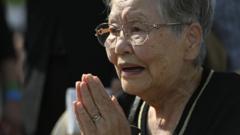At 08:15 on August 6, 1945, the world witnessed a tragedy when the atomic bomb 'Little Boy' was dropped over Hiroshima, claiming around 70,000 lives instantly. Among those were approximately 140,000 Koreans, many of whom were subjected to forced labor during Japan's colonial rule over Korea. Now, decades later, survivors like Lee Jung-soon, 88, and Shim Jin-tae, 83, continue to grapple with not only the physical repercussions of radiation exposure but also the societal stigma and neglect that followed.
Lee Jung-soon recounts the chaos of that fateful day, overshadowed by the trauma of survival. The devastation did not solely affect personal health; it also created a ripple effect in their families, as seen with Lee's son, Ho-chang, who suffers from kidney failure. The Korean Atomic Bomb Victims Association reports a higher fatality rate among Koreans compared to other victims, highlighting the systemic discrimination they faced.
The challenge does not end with the initial devastation. The survivors returned to Korea only to be met with prejudice and misunderstanding. Many were labeled as cursed or disfigured, creating a culture of silence around their experiences. Survivors like Han Jeong-sun, a second-generation victim, illustrate the deep-rooted stigma that even follows their children, linking the effects of the bombing across generations.
Despite calls for recognition and reparations, the Korean government has historically overlooked these victims, only beginning official investigations into their plight as recently as 2019. Junko Ichiba, a Japanese activist, emphasizes the importance of apologies and recognition from Japan for the injustices faced by Koreans during WWII, a sentiment echoed by many who feel that peace without accountability is hollow.
As the anniversary nears and discussions begin regarding historical acknowledgment, survivors like Shim Jin-tae believe that remembering these stories is pivotal. "Our bodies remember what we went through," he asserts, reminding us of the vital lessons from history that must be passed down. Without recognition, there’s a fear that these memories might vanish entirely, leaving future generations with an incomplete understanding of the past.
In the light of these revelations, the lesson remains clear: the stories of Hiroshima's Korean survivors deserve to be told, understood, and acknowledged, allowing us to remember and strive to prevent such atrocities from occurring again.





















